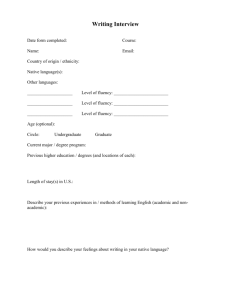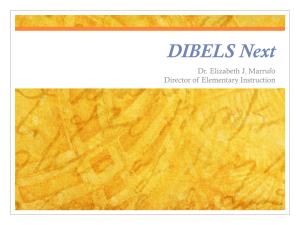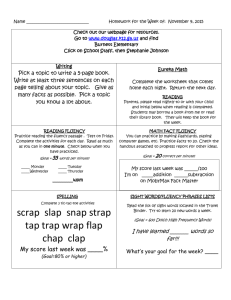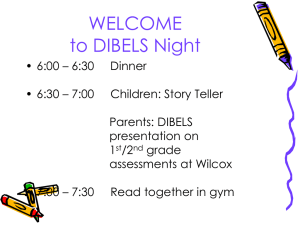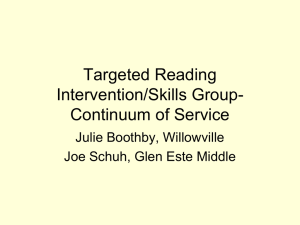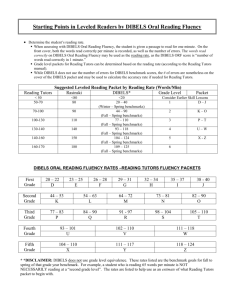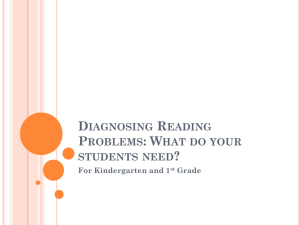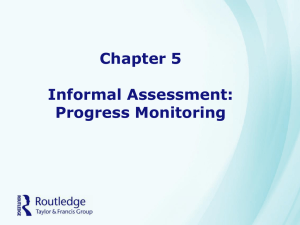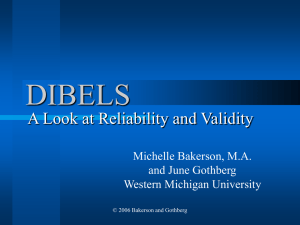Kindergarten Corner
advertisement
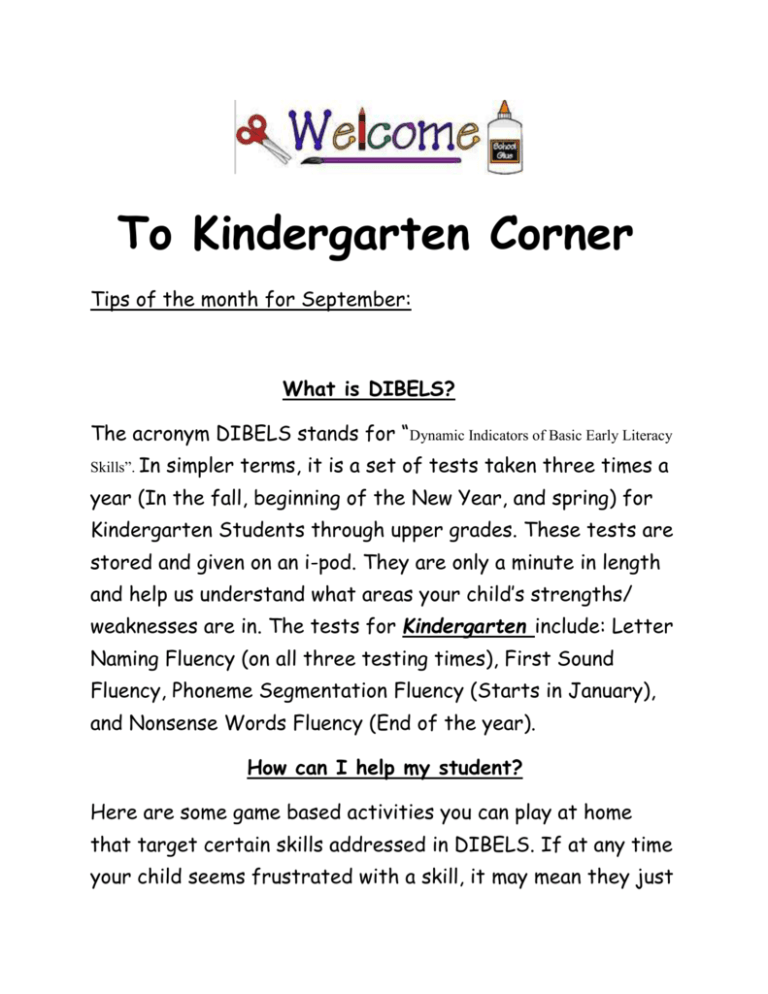
To Kindergarten Corner Tips of the month for September: What is DIBELS? The acronym DIBELS stands for “Dynamic Indicators of Basic Early Literacy Skills”. In simpler terms, it is a set of tests taken three times a year (In the fall, beginning of the New Year, and spring) for Kindergarten Students through upper grades. These tests are stored and given on an i-pod. They are only a minute in length and help us understand what areas your child’s strengths/ weaknesses are in. The tests for Kindergarten include: Letter Naming Fluency (on all three testing times), First Sound Fluency, Phoneme Segmentation Fluency (Starts in January), and Nonsense Words Fluency (End of the year). How can I help my student? Here are some game based activities you can play at home that target certain skills addressed in DIBELS. If at any time your child seems frustrated with a skill, it may mean they just aren’t ready for that level, as of yet. You may ask your child’s teacher for some advice. Sometimes children just need a little more time and may be ready for that activity later. Letter Naming Tips: 1) A) Font Styles: Let your child type on the computer using different kinds of fonts. This gets them used to seeing letters in different prints, and they learn to figure out what those letters are. For example: A, A , A, A,A, or A are all the letter A, but they don’t look all the same. This helps the student understand that letters don’t always look the same. B) Play “Letter Detective”: Students can practice finding letters they know on the back of boxes, cans, newspapers, magazines, and road signs….this all helps them understand the many fonts letters come in and transfer information to the real world. c) Play “Letter Race”: Let your child name all the letters they can in a paragraph, naming the letters left to right. Give them a set time and tell them to point to each letter. Make it a race by saying on your mark, “Get set, go!” Then, tell them to stop when they have used the time you have set. Count the letters they have named and try to beat that number the next time. First Sound Fluency Tips: 1) Play “What Sound”: In the car or someplace where you have their attention: ( i.e. as waiting in the Doctor’s office, Dentist….) 1) Tell your child three words that begin with the same letter. (i.e. truck, tooth, tent…) 2) Have the child try to listen for that first sound and figure out what it is. 3) Have them tell you the letter and the sound. 2) Play “My Word, Your Word”: Give the child a word as “cat” and have them come up with another word with the same first sound like “can”. Then, trade and let them come up with the first word and you match the beginning sound with another word. Phoneme Segmentation Fluency Tips: Phoneme Segmentation is when a student can hear all the sounds in a word and say them separately. As in the sounds for c-a-t. 1) Play “I Know That Name”: One way to help students learn how to sound segment is to use a word that they are very familiar with and can spell. Their name is a good place to start. Take each letter in order and say the sound for each letter as J-i-m. Try to pick up speed as you play the game. Do this a couple of times and then see if they can sound segment friends’ and family names. 2) Play “Word Glue”: In this activity, the student has mastered sound segmenting or is getting good at the skill. The student picks a word in their head and sound segments it out loud, but doesn’t put it together. The other person says, “Word Glue” and says the word out loud that the student is sound segmenting. Then they switch places and keep taking turns until one person misses. Nonsense Words Fluency Tips: 1) Alien Words: Write ten three letter words (like cat or hop) on a page with space to write around each of them. Some of the words should be nonsense words as: hoj or daf. Have the student put on their detective glasses and find the alien (nonsense) words on the page. When they have found an alien word, have them draw a spaceship around it and tell the word to go back to its planet. Have them do this until all the alien words are found. 2) Flash Pass: Make flash cards with three letter alien/nonsense words on them as hif, pum,… and a few cards with real three letter words as hot and top. Player one turns the flash cards as player two reads them. When player two sees a real word, they yell “Flash Pass”(they must also read the real word) and the two players trade jobs. The game comes to an end when all the cards are used up. Talk about DIBELS ; Testing is always announced before the test date. Some of the ways you can prepare your child for their DIBELS test is: 1) Talk about the process with your child. Sometimes children are a little nervous over something they don’t do all the time. So talking about it may help them feel mentally more prepared. See if your child’s Kindergarten teacher can tell you what time of the day their class will be going and what comes before/ after that time in their schedule. This will help your child know when they will be testing and it won’t be a surprise. 2) Tell your child that this is their time to shine and show off. Speak positively, and they will be positive. Our reading specialist is the one who gives the tests. Her name is Mrs. Stephens and she is very nice. We always say “She is there to see how awesome they are”…and all our students are awesome! :0) 3) We also tell students to eat brain food full of protein for breakfast and get a good night’s sleep…I don’t know how much this really does help for their testing time, but it makes them feel prepared. Question: We are blessed with a great Kindergarten team that wants our students to do well. Please, if you have any questions or ideas to ask or share, don’t hesitate to let us know. Mrs. Lewis is also very knowledgeable with DIBELS and was a Reading Specialist before she became a principal. So she is a great asset for information. Mrs. Stephens is our talented reading specialist and is dedicated in seeing that all children excel to their highest potential. She also is very willing to aid families in any way she can. Questions are welcome all around. We hope this information was a helpful look at what DIBELS is and how you can help your child at home too. We are so happy to work as a team with your family. Parents, as always, Thank you for all you do! :0) The Alban Kindergarten Staff

